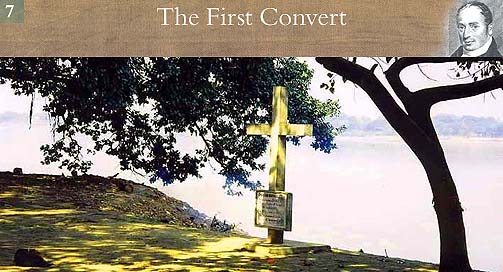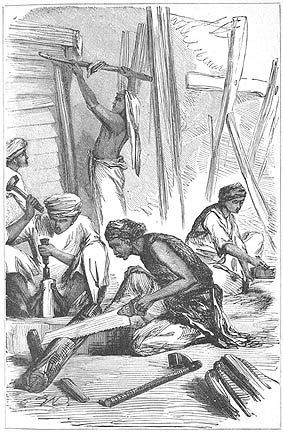

The memorial, close to the spot where Krishna-Pal, the first Christian convert was baptised by William Carey on Sunday 28th December, 1800. Photo courtesy Rev. Peter Shepherd, Broadway Baptist Church, Derby. On September 20th, 1800, Ward writes to one of his friends expressing the confidence of his mind in the vocation he has chosen, and the certainty of its ultimate success.
'You will expect me to say something of what we are doing, and in fact what sort of place we are in; and yet I know not, that I can say any more than I have said to others.
Here are priests by the thousands, but they never preach or instruct their flocks, except in a few ceremonies. Here are temples by the thousands, Musselman and Hindoo; but the praises of God are never heard in them. Here are plenty of doctrines, but none of them mend the heart, or in fact touch it.
The three great doctrines, which make such havoc of souls in Europe, are universally prevalent here. Both Musselmans and Hindoos believe, that punishment in hell is temporary, not eternal; there is not a man therefore, that cares about future punishment. Antinomianism is universal. With them it is the easiest matter in the world for God to pardon or pass over sin. Crimes indeed are necessary, they say, and God is the author of sin. Deism is, I believe, very prevalent, especially among the most refined Musselmans, and almost every European in the public service is a Deist.
The corruption of manners amongst all is dreadful. Instead of Hindoos being that innocent people, which some have pretended, they are as dissolute as any people on earth, though there is nothing ferocious in their manners. If anyone wishes to see the meaning of the apostle's words to the Ephesians, 'without hope, and without God in the world', let him come hither. The baseness and degradation of the people is so great, that many Europeans laugh at us for thinking of their conversion. It is almost the universal opinion among Europeans here, that our design is utterly chimerical.
Here, then, what triumphs will there be for divine grace? It is reserved for the latter days, and for the final triumphs of the Lamb, that Hindoos will be gathered in; as the thief and Jerusalem sinners were among his first triumphs. Doubt not, that our Saviour will certainly famish all these Gods, and lay them prostrate in the dust.'
On the 21st October, 1800, Ward went out to preach in Bengali for the first time. John Clark Marshman describes his developing linguistic gift for colloquial Bengali by saying that he achieved 'a degree of fluency and point which has seldom been attained by a foreigner'.
While the Bengali New Testament was being printed by the press, an extra 500 copies of Matthew's Gospel were produced. These books, together with Ram-bosoo's tracts, created quite a stir in the country. In their first attempts to evangelise Ward and Marshman found there was much to discourage them. Ward writes:
'There is a great deal of patience and self-denial required in collecting our congregations, and bearing with all their interruptions and wanderings. You stand by the side of a street or lane, a man passes, you ask him how he does, or whither he is going. Sometimes he replies, at other times he will go on, taking no notice of you. Sometimes he will stay till he has heard your message, and then sets off - if he stops, another stops, and another, and so on until a congregation is gathered. When you are in the middle of your discourse, half of them perhaps sheer off - some more come - a Brahmin interrupts you, "Why cannot the river wash from sin?" or some such question. Tell them they are in the way of everlasting ruin, perhaps one will answer, "Sahib's words are very fine; Sahib knows all shasters; these are shaster words." He will make his salaam and depart. I suppose brother Carey has preached a thousand sermons to such congregations as these."
According to Stennett, Ward writes in November, 1800, 'I begin to smatter a little Bengalee. God, I hope, has blessed my labours to the conversion of Mr. Carey's two eldest sons, and towards the close of January, I expect we shall be joined by 2000 (alluding to the New Testaments) more missionaries, of whose success I dare not indulge the least doubt. In a few weeks I hope we shall have to baptize four persons, a native, Mr. Carey's two sons, and Mr. Fernandez. The native has been raised under the ministry of Mr. Thomas, and has been in his service twelve months. He renounces cast, preaches Christ, and appears to be truly converted. Felix Carey has begun to preach, having known the language from his youth. I hope he will make a useful missionary; I bestow much labour upon him for this purpose.'
Christian Preaching in an Open Festival. Courtesy 'The Centre for the Study of the Life and Work of William Carey D.D., 1761 - 1834.'

Dr. John Thomas, First Baptist Missionary to Bengal. Courtesy 'The Centre for the Study of the Life and Work of William Carey D.D., 1761 - 1834.'
Mr. Thomas had been engaged in superintending his sugar factory at Beerbhoom and returned to visit the Serampore brethren in October. He brought with him a skilful worker from his establishment called Fukeer who gave every indication of wanting to convert to Christianity. This was the first native, after seven years of missionary exertion, who had come to this point. He was received as a Christian brother with indescribable emotion and each one shook him by the hand.

Hindu Carpenters. Courtesy 'The Centre for the Study of the Life and Work of William Carey D.D., 1761 - 1834.' On the same day, Thomas, who was a physician, was asked to set the dislocated arm of a native of Serampore. After the operation, Thomas talked to the patient with his usual fervour on the folly of idolatry, and the superiority of Christian revelation. The man, a carpenter, appeared to be deeply affected by this and shed tears. His name was Krishna. His brother, Goluk, had repeatedly visited the Mission House, engaged in the daily discussions, and was classed as one of the hopeful enquirers.
Two days after the treatment, with his arm in a sling, Krishna met Ward and Felix Carey (William's eldest son) in the street, and was invited back to the Mission House for further discussion. He cheerfully consented, remarking that they had not only relieved him of bodily suffering, but had brought good news to his door.
Fukeer, in the meantime, had decided to return to Beerbohm to take leave of his friends before having to leave them for ever. Thomas decided to accompany him. Fukeer asked to visit a friend for 3 days but never returned. No more was heard from him. Thomas returned to Serampore greatly depressed.
Krishna, by contrast, was in daily communication with the missionaries and received instruction with enthusiasm. His wife and daughter offered themselves as candidates for baptism.

Portrait of Krishna Pal, the first Christian convert. From 'Ward's Memories of Krishna-Pal', by William Ward, Serampore, 1822. Reprinted by John Offor, London, 1823. Courtesy Derby Local Studies Library. Stennett reproduces the following letter:
'December 12. This day Gakool and Krishno came to eat tiffin with us, and thus publicly threw away their caste. Brethren Carey and Thomas went to prayer with the two natives, before they proceeded to this act. All our servants were astonished: so many had said, that nobody would ever mind Christ, or lose cast. Brother Thomas has waited fifteen years, and thrown away much time upon deceitful characters; brother Carey has waited, till hope of his own success has almost expired: and after all, God has done it with perfect ease. Thus the door of faith is open to the Gentiles; who shall shut it? the chain of cast is broken; who shall mend it?'
In the evening Goluk, Krishna, and his wife and daughter came before the church, and explained the successive steps by which they had decided to embrace Christianity. Thomas became frantic with joy. The prospect of the first convert excited him to the point of insanity. Within 3 days he had become so violent that he had to be placed in restraint.
Ward writes:
'We now begin to talk of baptism. We yesterday fixed on the spot, before our gate in the river. A difficulty has been stated, if we baptize in the river, the natives will suppose there is something sacred in the Ganges. Others reply that they would rather think we defiled it by the ordinance.'
The report that Krishna had thrown up his caste spread through the town, and the next morning a violent mob of 2,000 people collected outside his house. They dragged him and Goluk to the Magistrate's house without any specific charge against them. The Magistrate commended the converts for having renounced their caste and told the crowd to disperse. Soon after, the crowd brought them back and accused Krishna of having refused to deliver his daughter to the man to whom she was betrothed. But the converts were again set at liberty, and the girl was assured that she would not be compelled to marry against her will. A native soldier was placed outside Krishna's house and the Governor offered to protect the missionaries against all interruption during the forthcoming baptism.
The missionaries found that the public profession of a foreign creed and the abandonment of all social and family ties was a greater obstacle that they had anticipated. Goluk, and Krishna's wife and daughter asked for their baptism to be postponed. Krishna was resolute that his should go ahead.
The next morning, Sunday 28th December, 1800, baptism was performed under the most solemn and distressing circumstances. The missionaries assembled in the chapel and Carey walked down to the river with Krishna and Felix, who was also being baptised, on either side of him. Thomas, who was confined to his couch, made the air resound with his blasphemous ravings, and Mrs Carey, shut up in her room on the opposite side of the path, poured forth the most painful shrieks.
At the ghat, or landing stairs, the Governor, several Europeans, many Portuguese and a dense crowd of Hindus and Mohommedans, were waiting to witness the ceremony. Carey explained that they did not believe there was any Divine virtue in the river but regarded it as a simple element of water; that Krishna was formerly of their creed, but professed by the act of baptism to renounce his belief in the gods, and become a disciple of Jesus Christ. The most perfect silence and a feeling of deep solemnity pervaded the whole assembly, and the Governor was moved to tears.
In the afternoon, the act of Communion was administered for the first time in the Bengali language. Thus ended the first and most eventful year of the Serampore Mission.